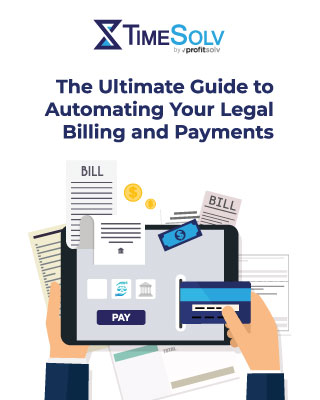Know that sinking feeling you get when you need to be somewhere and can’t find your keys? We’ve all had those moments where we’ve misplaced a necessity (only to discover it later in the fridge). Now, imagine that same feeling, except it’s your law firm’s finances that are in disarray.
Not the best feeling, right?
Just as we need certain routines in our daily lives to feel secure, the financial backbone of a law firm thrives on order.
While it’s easy to get lost in the hustle of court dates and client meetings, there’s a silent force at play in your law firm: financial management. It’s not the stuff of courtroom dramas, but mastering this can mean the difference between a thriving firm and one that’s just scraping by.
Ready to get a handle on your law firm’s finances? Let’s dive into the dos and don’ts.
What goes into law firm financial management?
If you’re just dipping your toes into law firm financial management, there are three pillars you should familiarize yourself with: budgeting, accounting, and financial planning.
Financial management requires attorneys to establish practices for the following activities:
- Setting clear operational and matter budgets
- Establishing short- and long-term financial goals
- Maintaining solid legal accounting practices
- Meeting compliance requirements for trust accounting
- Creating yearly financial projections for growth planning
- Reviewing and updating financial reports for revenue, profitability, and cash flow
Dos and don’ts of law firm financial management
Most lawyers would prefer to focus on providing legal services and working with clients, but the reality is that the majority of law firms in the United States are small and solo practices. Because small and solo practices generally have fewer resources, it’s vital to maximize them.
The good news is that you don’t need to have a background in accounting to successfully manage your firm finances. Following the dos and don’ts below can give you a head start.
Do: Embrace legal accounting best practices
Your accounting is fundamental to your law firm. It’s the pulse that indicates your firm’s health. Yet accounting—especially legal accounting—can be complex, and there are ample opportunities for missteps.
To reduce the risk of financial management mistakes, lean into legal accounting best practices to support your firm. Establish clear policies for handling:
- Time and expense tracking
- Law firm budgets
- Trust accounting
- Billing, invoicing, and payments
- Reporting
Don’t: Rely on manual data entry
Leveraging technology to streamline data input isn’t just smart—it’s essential to law firm profitability. When you rely on manual data entry, it consumes valuable hours and increases the risk of human error, which can have cascading effects on your financial reports.
Automate wherever possible to reduce errors and save time. By automating, you’re ensuring accuracy and freeing up your team to focus on more strategic, value-added tasks. Remember, time saved is money earned.
Do: Recognize the benefits of legal billing software
Legal billing software takes the hassle out of creating invoices each month and reduces your AR. It empowers you to:
- Automate billing: Streamline invoicing to free up valuable time for more crucial legal matters.
- Accept digital payments: Enhance client trust with secure and swift payment options.
- Offer flexible payment plans: Cater to diverse client needs with a range of payment options.
To get the maximum benefit, look for integrated legal billing, time and expense tracking, project management, and more in one comprehensive online solution.
The Ultimate Guide to Automating Your Legal Billing and Payments
To stay competitive in today’s legal landscape, law firms must embrace the power of technology, especially when it comes to billing and payments.
The best way to improve your law firm’s cash flow while also increasing client convenience is 'Automation'.
Download our free guide to improve your legal billing and payment process today!
Don’t: Cling to outdated invoicing methods
Modernize your approach to ensure efficiency and client satisfaction. Sticking to archaic (e.g., postal mail and cash-based) billing practices can slow down payment processes, frustrate clients, and create unnecessary administrative burdens.
Clients expect swift and seamless transactions, so adapting to the latest billing technologies is paramount. Use flexible billing templates to reduce the time it takes to compile an invoice, batch generate them with a few clicks, and allow your clients to pay you online to reduce your AR.
Do: Use a central financial dashboard
How close is your law firm to meeting its goals? How was last month’s revenue compared to the previous one? Are you in a position to hire another attorney?
How you answer these questions strongly influences the success of your decisions.
A financial dashboard provides you with a big-picture idea of your firm’s health. It allows you to:
- Centralize data analysis: Have a comprehensive view of your firm’s financial health at your fingertips.
- Make informed decisions: Leverage insights from the dashboard to make strategic financial decisions.
Don’t: Make decisions based on gut feelings
While intuition has its place, financial matters demand evidence-based decision-making. Gut feelings can be influenced by biases or emotions, potentially leading to costly missteps. So trust, but verify. Quantitative data offers an objective lens, providing clarity and direction. Always rely on data and measurable insights to guide your financial strategies.
Do: Equip your firm with essential financial management tools
Law firms benefit from using financial management tools, but not all tools deliver the same benefits. To give your practice the greatest advantage, look for tools that allow you to:
- Track time and expenses seamlessly
- Establish flexible payment options for clients
- Create and deliver online invoices
- Sync data with legal accounting tools
Don’t: Overlook the importance of integrations
As you assess software solutions, check that they integrate with one another to ensure seamless data flow across platforms and sync all your financial data. Choosing software that offers lots of practical integrations makes your workflows more efficient and boosts accuracy.
Master your firm’s financials with TimeSolv
The most successful law firms have a secret weapon in their arsenal: practice management software. It’s not just about managing cases or scheduling; it’s about having a comprehensive grip on finances, ensuring every dollar is accounted for and every project stays on track.
This is where TimeSolv truly shines. TimeSolv supports law firms by helping them accomplish key financial management tasks like:
- Creating matter estimates
- Limiting billable expenses
- On-the-go expense entry with the TimeSync App
- Tracking KPIs
- Seamless integration with QuickBooks
- Comprehensive reporting
- Automating the billing process
- Seamless credit payments
- Diverse payment plans for clients
With TimeSolv, law firms are empowered to master the financial game. If you’re ready to join the ranks of elite law firms with stellar financial management, sign up for a free trial of TimeSolv today!
The Ultimate Guide to Automating Your Legal Billing and Payments
To stay competitive in today’s legal landscape, law firms must embrace the power of technology, especially when it comes to billing and payments.
The best way to improve your law firm’s cash flow while also increasing client convenience is 'Automation'.
Download our free guide to improve your legal billing and payment process today!


